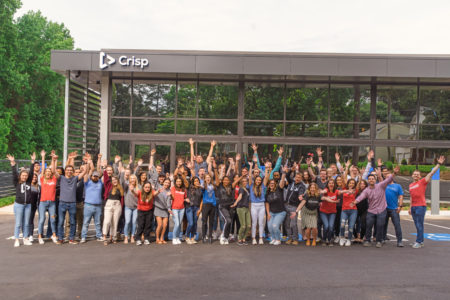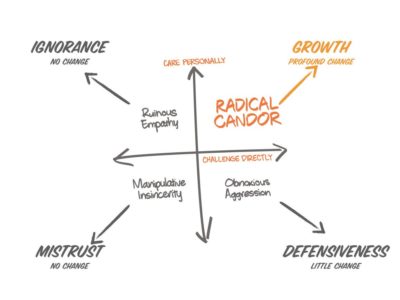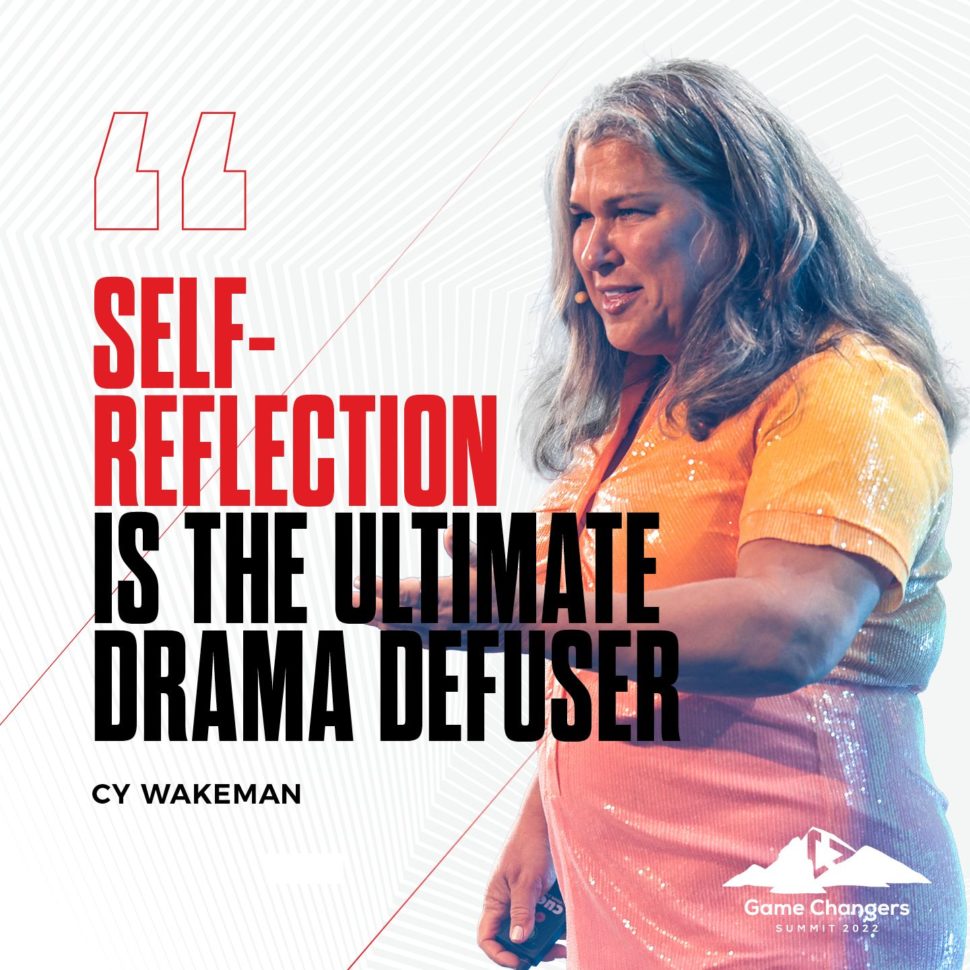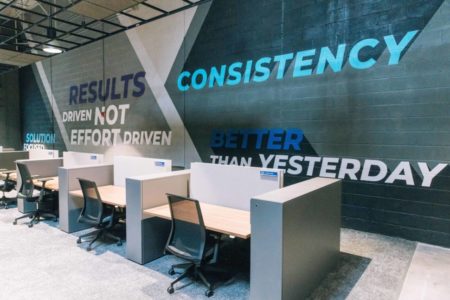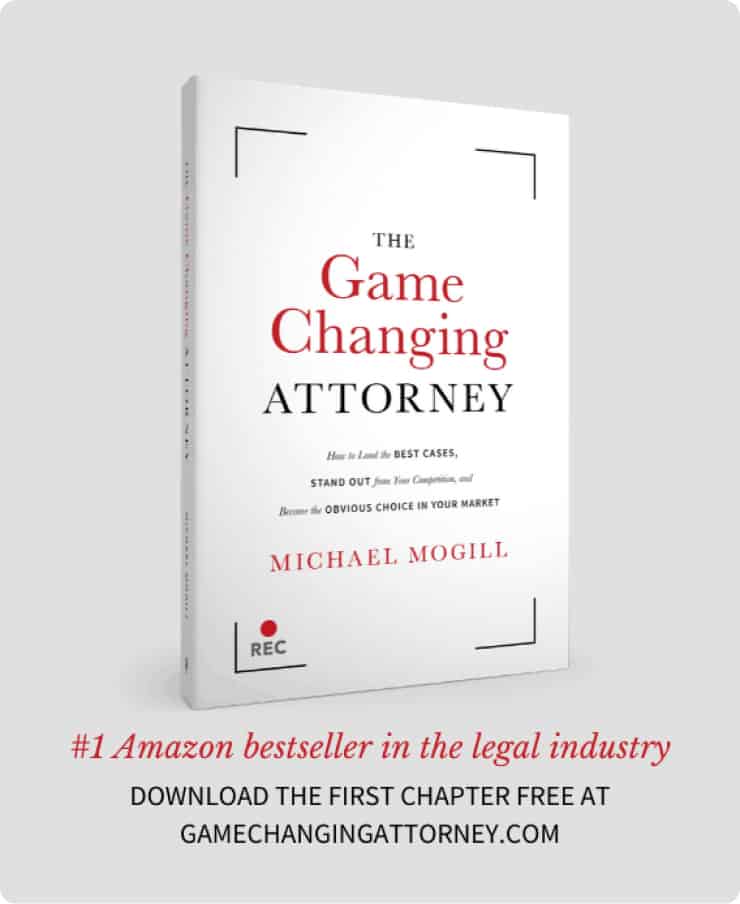“We talk more about our people than we do to them.” – Cy Wakeman
Weigh those words.
Workplace drama is one of the leading killers of productivity — and the lack of addressing the drama is even worse.
Drama is essentially emotional waste, whether that comes in the form of unnecessary gossip, unproductive behavior, withholding buy-in, resisting change, or stepping down from accountability.
If there’s drama in your law firm, it’s negatively impacting the culture — and culture is everything.
In this article, we’ll explore seven ways to foster a healthy workplace culture where everyone is rowing together toward the same goals.
- Align With the Vision
- Define Career Paths
- Enact Radical Candor
- Instill Accountability
- Cut the Drama
- Nurture Impact Players
- Abide By Your Core Values
What is Workplace Culture?
Culture is the character and personality of your organization. It’s what makes your business unique and is the sum of its values, traditions, beliefs, interactions, behaviors, and attitudes.
In short, your law firm’s culture is how work gets done.
Your culture can be your organization’s competitive advantage. It’s the reason why people want to work with you, for you, and by your side. Finding smart, capable people is just half of the battle. If they don’t align with your law firm’s culture, they will only bring you down.
If excellence is contagious, then mediocrity can be too.
Check out some of these important statistics surrounding culture in the workplace:
- Company culture is an important factor for 46% of job seekers.
- 94% of entrepreneurs and 88% of job seekers say that a healthy culture at work is vital for success.
- 86% of job seekers avoid companies with a bad reputation.
- Millennials prioritize “people and culture fit” above everything else.
As you can see, having a strong culture is something that every company should strive for. From hiring the best talent, to retaining that talent, to working with the best clients, the importance of your firm’s culture is something that can’t be overlooked.
If you don’t know where to start, never fear — prepare to uncover the secrets to creating a workplace culture that gets results.
1. Align With the Vision
A vision isn’t just for big Fortune 500 companies. It’s something that every business should have — including your law firm. A long-term vision for your law firm gives the organization direction, provides a meaningful mission for team members to rally around, and attracts A-players looking for a calling instead of just a job.
This is precisely why your law firm needs to make its vision loud and clear. It should communicate what matters most to you, and should attract them to something bigger than themselves that they can contribute to, be a part of, and get behind.
Having a strong and clear vision attracts the kind of team members who will help you achieve it. When applicants feel energized and committed to your organization’s vision up front, it minimizes the number of bad-fit hires that come through your door.
But it doesn’t just stop with new hires. Your vision can ultimately end up being the reason why your existing team members choose to stay or not stay with your law firm. As a leader, you want to retain the A-players you worked so hard to attract, and your vision can be the inspiration for their commitment and dedication to helping your organization succeed.
Here’s how to align your team with the law firm’s vision:
- Define the overall goal of your organization based on what you do and who your ideal client is.
- If someone applies to work for your firm, they should see your vision everywhere on the website and even the application. They need to know what it is upfront so they can determine if they would be a good fit for you.
- Show team members how their individual performance helps the firm’s overall success. Don’t let them think they’re just another cog in the machine (because they’re not).
When your team understands and aligns with the vision of the firm, they will see how it fulfills their own goals and purpose. Being a collaborator in part of the bigger mission will improve the level of engagement your team feels in their professional and personal lives.
If each team member can see how their piece of the puzzle translates to something meaningful, they will begin to internalize the ideals of the firm and work towards them. You’ll notice that they’ll even start to incorporate them into their own lives outside the office.
2. Define Career Paths
If your team doesn’t understand what their growth trajectory is, then they aren’t going to see the long-term vision as a way to achieve their own goals and aspirations.That means that they will likely choose to leave your organization — or worse, stay but get stagnant.
In today’s market, employers are looking to retain and engage the best talent more than ever before. Each law firm is in a race to build the best team, but the only ones who will successfully hire (and keep) those A-players are the ones who demonstrate that growth is a part of the role.
One of the main drivers of high turnover is allowing team members to stay stagnant in their current roles. In fact, those who stay longer in the same job without a title change are significantly more likely to leave for another company in order to reach the next phase of their career.
Every team member’s individual career path needs to be drawn out and clearly communicated.
Here at Crisp, we’ve taken the time to map out where every member of our team has the potential to go, from the bottom of the totem pole all the way to the corner office. Each career path includes salary increases, KPI tracking, incentive potential, and precise criteria to qualify for each advancement step on the career path. On top of that, leadership regularly meets individually with each team member to keep them on track toward reaching the next phase of their career.
The more you involve your team members with their progress, give them praise where it’s due, and communicate candidly about areas they may be falling short, the more engaged your team will be. Engaged team members lead to a healthy, thriving culture, which then leads to a successful firm.
3. Enact Radical Candor
Kim Scott brought the concept of Radical Candor to the world in the best-selling book Radical Candor: Be A Kick-Ass Boss Without Losing Your Humanity.
Radical candor is the ability to care personally about your team members while challenging them directly at the same time.
Great leaders certainly praise their team members when they’re performing at their best. However, it’s also their responsibility to let them know when they fall short and there’s room for improvement. It’s not always the easiest or most comfortable thing to do as a leader — but it’s necessary for everyone to grow.
Here’s what radical candor does and does not look like:
- DO: Care personally. A workplace identity doesn’t mean acting like a robot and leaving human empathy at home.
- DO: Challenge directly. Be upfront and straightforward when necessary. Feedback is a gift.
- DON’T: Obnoxious aggression is a state people arrive at if they forget to care personally.
- DON’T: Manipulative insincerity is when politics and drama take the place of care.
- DON’T: Ruinous empathy involves being too kind and avoiding direct conflict.
Despite how it might feel sometimes, it is possible to mitigate unwanted office behaviors and actions by identifying when team members are erring too far into one category and gently redirecting them into the appropriate state.
You have the ability to create a balanced work environment, and as the leader, it begins with you. Lead your team members to operate at their best and you both will be rewarded with a more effective work culture.
4. Instill Accountability
Accountability is crucial for fostering a successful growth-oriented culture at your law firm.
If you’re scratching your head wondering what accountability even is, here’s a refresher: Accountability is the fact or condition of being accountable; responsibility.
Here at Crisp, one of our core values is Take Ownership. If someone is taking ownership, it means they’re stepping up and stepping in rather than waiting for others to take action first. They are always accountable for the results of their own actions, and they will be the first to take the initiative to bring positive results and learn from moments of failure.
While everyone talks a big game about accountability, not all organizations are actually able to deliver it. It starts with one’s willingness and commitment to do whatever it takes to get the desired results. As the leader of your law firm, you have two choices when a team member comes to you with a problem:
- You can respond with sympathy, collude with them, and agree that you are all at the mercy of your circumstances. When you do this, there is no growth, no change, and no transformation, and it will likely happen again.
- You can respond with empathy, truly hear them out, and call them up to greatness. Help them see this particular stressful moment as an opportunity for growth, and then strategically coach them to step up and step into their full potential.
A strong culture is one with high accountability that rewards high performers and weeds out unimproved low performers. Encourage your team to find solutions instead of getting frustrated and giving up — or worse, complaining about the challenges they will all inevitably face.
Your law firm will thrive under your leadership, or it will fail — just like the culture will. If you build and encourage an environment that values extreme ownership and high accountability, your team will be successful.
5. Cut the Drama
The number one most requested speaker to return to the Game Changers Summit 2022 was Cy Wakeman, best-selling author, workplace drama researcher, and leadership consultant. Once you understand the power of her teachings, you’ll understand why.
Cy has dedicated her life to studying how ego, drama, and unprofessional behavior create mayhem and toxicity in the workplace. Here are just a few of the shocking statistics Cy has found over the years:
- Each team member partakes in an average of 2.5 hours of drama per day, which equals 17 hours per week, which equals 68 hours per month, which ultimately equals 816 hours per year.
- 32 percent of 816 hours is pure ego.
- 23 percent is resisting accountability.
- 14 percent is fighting buy-in (you must convince me to do that thing).
- 13 percent is resisting change.
- 8 percent is engagement struggle.
How do you know if you’ve got workplace drama in your law firm?
Here are some of the most common — and detrimental — patterns:
- Gossiping and tattling
- Bargaining and withholding buy-in
- Resisting changes and new procedures
- Lack of accountability
- Blaming others or circumstances for low performance
All of these sources of drama will stunt your law firm’s growth.
The fact of the matter is that you endorse what you tolerate. If your team members show up late to work every day and you don’t say anything about it, you have set the new standard. The same goes for putting up with drama and undesirable behavior in the workplace, thus creating a negative environment for you and the rest of your firm.
Drama doesn’t belong in your law firm, so kick it out for good.
6. Nurture Impact Players
Liz Wiseman is a management researcher, executive advisor, and New York Times best-selling author who’s constantly looking for ways to improve leadership in the workplace and at home — and she’s one person you’ll want to turn to if you’re trying to improve the culture at your law firm.
In Liz’s book Impact Players: How to Take the Lead, Play Bigger, and Multiply Your Impact, she investigates the commonalities of top employees (impact players) that lead and thrive while on the job by taking the initiative, leaning into change, and de-escalating problems.
In short, an impact player is a talented standout contributor who raises the level of play for the whole team, and those are the people that everyone’s looking for in today’s world. If you want to find your own, build a culture worthy of an impact player.
Impact players look at unclear direction and changing priorities as chances to add value to themselves and their organization. They view everything as an opportunity — from lack of clarity, to fixing problems, to simply doing their job. They put their all into everything they do, and they are the people who will elevate your firm’s culture to the next level. While simple contributors currently see a messy problem as a distraction from their job, impact players see it as a chance to be useful — and more importantly, do the job that’s needed.
While you might think that impact players are born, not made, that’s not true. Anyone can become an impact player with the right culture and leader. To quote Mary Parker Follett as cited in Impact Players:
“Leadership is not defined by the exercise of power but by the capacity to increase the sense of power among those led. The most essential work of the leader is to create more leaders.”
People want to be better, but sometimes they just might not know how to get better. That’s where you, the leader of your law firm, comes in. The real reward is discovering what we are truly capable of, and if you can coach your team to all be impact players, your workplace culture will not be beat.
7. Abide by Your Core Values
Just as your vision contributes to the culture of your firm, so do your core values. They are the fundamental beliefs of a person or organization. They not only help you connect with your ideal clients, but they also help with attracting and retaining the right team members — and powering the culture you create for your law firm.
Studies show that 77 percent of consumers do business with companies that share the same values as they do. That’s why companies like Whole Foods, Delta, and Apple are all frequently visited by millions of like-minded consumers weekly.
Here at Crisp, our core values are so important that we even have them displayed on our walls for all to see and be reminded of what we stand for every day. Here’s how we operate:
- Results Driven, Not Effort Driven – Keep your focus on achieving metrics and objectives; stay committed to the end; never lose sight of the goal.
- Vested in Client Success – Go the extra mile; find a solution no matter what; ensure clients’ best interests are always the focus.
- Better Than Yesterday – Hold yourself to the same expectations you hold teammates; learn from your mistakes and make progress; insist on higher standards for yourself and your teammates.
- Solution Focused – Make impactful and effective changes; speak up when something is not working; keep your mindset focused on finding the right solution rather than only bringing problems.
- Take Ownership – Step up and step in rather than waiting for others to take action first; be accountable for the results of your actions; take the initiative to bring positive results and learn from moments of failure.
- Team First – Jump in when you see your teammates in need of help; be proactive in finding ways to add value; focus on our vision that we can all be constantly working together toward achieving $1 billion in impact.
- Consistency – Repeat your behaviors until your habits become second nature; be consistent with your work, habits, mindset, and grind; be a game changer every single day.
These core values were carefully chosen based on what our leaders — and all team members — hold true in their own lives.
In order to live by your core values, you’ve got to hire, fire, and make decisions 100 percent in alignment with your firm’s core values. Look for people who practice what they preach, because those are the ones you want on your team for the long haul. They will help create an effective workplace culture and ultimately get your law firm where you want it to go.
Final Thoughts
Culture is how work gets done in your organization. If your law firm emphasizes accountability, growth, vision, and results, then you’re going to cultivate the best people who emulate those values in their everyday lives — and they’ll be thankful to work for an organization that feels the same way.
You’ve got the tools to build the perfect culture for your law firm. Now it’s up to you to put them to use and get what you want.
Enter: Crisp Coach.
Crisp Coach is a closed-door community of the highest-performing law firms, and that means yours.
Apply to join this highly sought-after growth program today.
